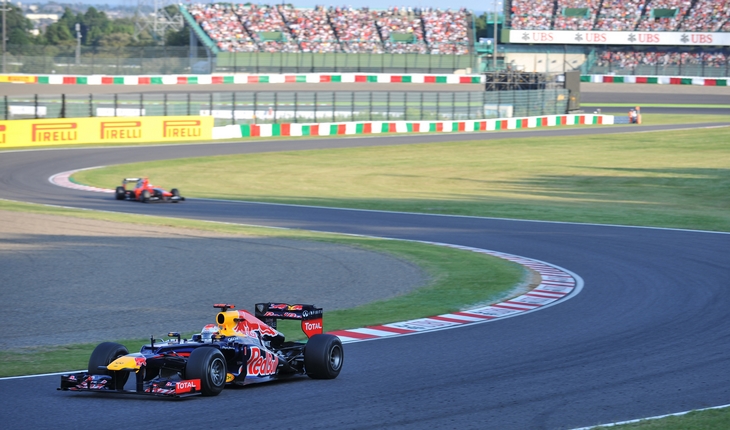Suzuka is one of the world's great circuits and television viewers had a slightly different view of it during this year's Japanese Grand Prix.
For the first time the host broadcast feed was provided by Formula One's central television production division rather than Japanese broadcaster Fuji TV.
Fuji TV, title sponsor of the Japanese Grand Prix for many years, had somehow retained the host broadcast rights to the race until this year, one of only two non-Formula One Management produced races of the year (the other, incidentally, is the Monaco Grand Prix where Tele Monte Carlo continue to produce the world feed).
Formula One Management also spent the weekend experimenting with the use of digital advertising banners; a massive digital UBS ad was visible to television viewers during qualifying and the race from a camera stationed high above Spoon Curve.
Money talks
With Lewis Hamilton confirmed at Mercedes and Sergio Perez all set to slot in as his replacement the moment this season ends, the 2013 driver market dominos are starting to fall.
Felipe Massa and Kamui Kobayashi, neither of whom currently have a contract for next year, both did themselves a power of good by finishing on the podium in Japan but it's worth examining drivers on the fringes of the sport, especially those with significant financial backing. In the current economic climate it is they who hold the key.
Three to keep an eye on in the coming weeks, then, are Max Chilton, a young Brit backed by Aon through his father's position as a vice-chairman of the insurance giant; Dutchman Giedo van der Garde, Caterham's reserve driver who might be in line for a step-up and brings sponsorship in the form of fashion brand McGregor; and Esteban Gutiérrez, another young Telmex-backed driver who Sauber might be inclined to promote in its bid to retain its crop of Mexican sponsors when Perez leaves for McLaren.
Money talks in Formula One, never more so than at this stage of the season.
Maldonado’s vote of confidence
All in all it was a good weekend for Pastor Maldonado. The Venezuelan scored his first points since he won the Spanish Grand Prix back in May but a greater joy may have been the re-election of controversial Venezuelan president Hugo Chavez.
Chavez has long held the key to Maldonado's Formula One career through the multi-million dollar backing of state-owned oil firm PDVSA. A new term for Chavez almost certainly means a new one for the fast but temperemental Maldonado too.
Paying to play
10 of the 12 Formula One teams met at Suzuka – only the two Red Bull teams were missing – to discuss various proposals about the financial future of Formula One, notably the FIA's somewhat cheeky plan to dramatically increase entry fees.
FIA president Jean Todt has suggested the move in a bid to generate more revenue for his organisation – perhaps as much as UK£10 million. The model would involve the best performing teams paying more to enter the next season, with a fee of £3,080 per point currently under discussion.
Under the plan, it would have cost some UK£2.7 million for Red Bull Racing to enter this season's championship following its success last year.
A Greek odyssey
Four of the five Grands Prix left on this year's 20-race calendar will take place at circuits built in 2009 or later – the Korea International Circuit, Delhi's Buddh International Circuit, the Circuit of the America's in Texas and Abu Dhabi's Yas Marina are all evidence of Formula One's push for new markets.
Russia is already on the cards for 2014 and Thailand, if rumours are to be believed, might be next with sketchy plans for a street race around Bangkok on the table. Everyone, it seems, wants a Grand Prix but amongst the more unlikely proposals is the Greek plan to construct a Formula One-spec circuit at a cost of €94 million.
Reports last week suggest up to a third of that budget will come from the public purse of a country with an economy on its knees. Believe it only when it happens.

